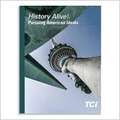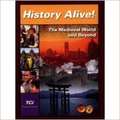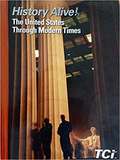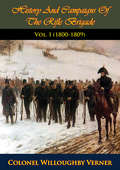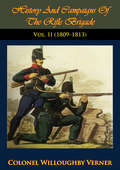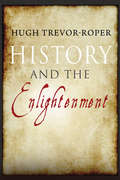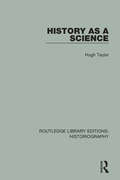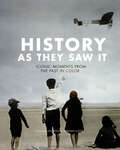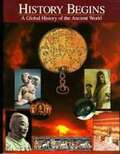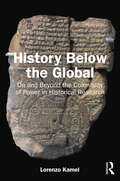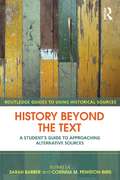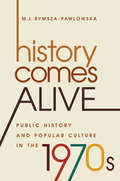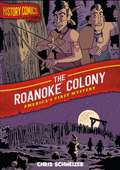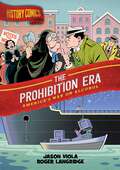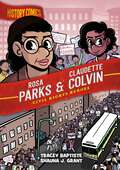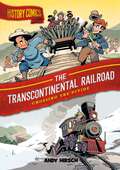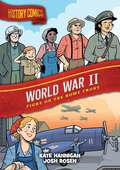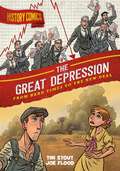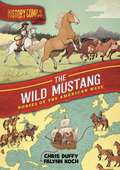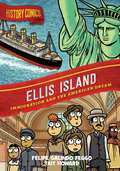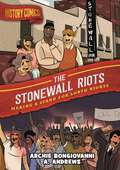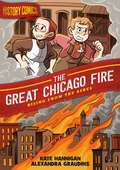- Table View
- List View
History Alive! The World Through 1750
by Teachers' Curriculum InstituteExplore the world through 1750 with History Alive! The World Through 1750 HC
History Alive!: The Medieval World and Beyond
by Teachers' Curriculum InstituteNIMAC-sourced textbook
History Alive!: The United States Through Modern Times
by Diane Hart Bert Bower Teachers' Curriculum Institute StaffA valuable resource full of imaginative, ready-to-use ideas for social studies teachers who want to involve students of all ability levels in the learning process. History is presented from a multicultural perspective to maximize student awareness.
History And Campaigns Of The Rifle Brigade Vol. I (History And Campaigns Of The Rifle Brigade #1)
by Colonel Willoughby VernerStory of The Rifle Brigade from its formation in 1800, its organization, uniform, equipment, arms and training and battles ending at Corunna in January 1809.The Rifle Brigade was formed in 1800 by detachments from various regiments as the 'Experimental Corps of Riflemen' initially and then 'Rifle Corps'. It was under this name that the new regiment first made its mark under Nelson in the following year at the Battle of Copenhagen. In 1803 it was designated the 95th (Rifle) Regiment and in 1816, after Waterloo, it was taken out of the numbered regiments of the line and styled 'The Rifle Brigade.' In this first part the author, who served in the regiment, traces the evolution of the Rifle Corps with the advent of the rifle, which replaced the musket, and its effect on tactics...Dress, drill, equipment and armament all feature and the important period spent at Shorncliffe when Sir John Moore, the father of the Light Brigade, commanded the garrison; he was then regarded as " the best trainer of troops England has ever possessed." The first taste of action came with the Ferrol Expedition in 1800 which had the destruction of the Spanish base. The 'Experimental Corps of Riflemen' contributed detachments numbering 170 under the command of Stewart. They were first ashore on 25th August and it was the only corps in action on that day, which henceforth was celebrated as the birthday of the Regiment. During the next nine years covered in this book the regiment served on many fronts--Copenhagen, Germany, Monte Video, Buenos Ayres and finally the Peninsula where the 2nd Battalion arrived on 12th July 1808 and fought its first action against the French, at Rolica on 17th August. This first part ends with the terrible retreat to and battle of Corunna in January 1809 where Moore "was struck down by a round shot ......the ball carrying away his left shoulder and leaving his arm hanging by the exposed tendons." Moore died of his wounds that same evening.--Print Ed.
History And Campaigns Of The Rifle Brigade Vol. II (History And Campaigns Of The Rifle Brigade #2)
by Colonel Willoughby VernerHistory of Rifle Brigade from 1809 to 1813 - mainly Peninsular War in which the regiment was involved from start to finish.On 10th May 1809 the strength of the 1st Battalion was 1,536 and the 2nd 1,579 and so a 3rd Battalion was formed. The unfortunate 2nd Battalion was involved in the Walcheren expedition August to December 1809 and when our troops evacuated the place battle deaths had amounted to 111, deaths from disease numbered over 4,000. But the main subject in this volume is the Peninsular War in which the regiment played a very active part from beginning to end. All three battalions were involved and seventeen Battle Honours were awarded, the highest number for any regiment in that campaign. The descriptions of operations are in detail, supported by superb maps. Throughout his account the author draws upon contemporary sources, official correspondence, despatches, reports, letters, diaries, reminiscences and on the work of such historians as Fortescue and Oman. --Print Ed.
History And The Enlightenment
by Hugh Trevor-RoperArguably the leading British historian of his generation, Hugh Trevor-Roper (1914-2003) is most celebrated and admired as the author of essays. This volume brings together some of the most original and radical writings of his career--many hitherto inaccessible, one never before published, all demonstrating his piercing intellect, urbane wit, and gift for elegant, vivid narrative. This collection focuses on the writing and understanding of history in the eighteenth century and on the great historians and the intellectual context that inspired or provoked their writings. It combines incisive discussion of such figures as Gibbon, Hume, and Carlyle with broad sweeps of analysis and explication. Essays on the Scottish Enlightenment and the Romantic movement are balanced by intimate portraits of lesser-known historians whose significance Trevor-Roper took particular delight in revealing.
History As A Science (Routledge Library Editions: Historiography)
by Hugh TaylorExamining why the study of history as a science was not as advanced as other disciplines, the author of this book, originally published in 1933, examines the arguments in the controversy of what the object of history should be. He then discusses the impact of the study of history on government, war and revolution .
History As They Saw It: Iconic Moments from the Past in Color
by Wolfgang Wild Jordan Lloyd“Why do we think of history in black and white? Here is the past in vibrant color . . . a remarkable book that re-imagines a century.” —Aspen Daily NewsThe past didn’t actually happen in black and white, as we’re reminded by this collection of restored and colorized historic photos from the mid-19th to mid-20th century. This revolutionary photography collection is as close to time travel as it gets. Featuring 120 historic black-and-white photographs thoroughly restored and rendered in color, this book illuminates some of the most iconic moments in history, from the sinking of the Titanic to the construction of the Golden Gate Bridge. Brought to life with vibrant color, these incredible images effectively blur the distinction between past and present, making history feel more real and and bringing it within arm’s reach. With a timeline spanning more than 100 years, from 1839 to 1949, this unique collection will amaze history and photography buffs alike, offering new perspectives on significant moments of the nineteenth and twentieth centuries.
History Begins: A Global History of the Ancient World
by Sheena Coupe Barbara ScanlanA comprehensive introduction to global history.
History Below the Global: On and Beyond the Coloniality of Power in Historical Research
by Lorenzo KamelHistory Below the Global aims to foster an entangled knowledge of global history, and to place "others" at the centre stage, to better understand the fluid world which we inhabit.Relying on primary sources in seven languages and books written by hundreds of African, Asian, Middle Eastern and South American scholars, Lorenzo Kamel examines the coloniality of power in historical research and sheds light on the largely neglected roles of the "others" and their modernities in history. The book provides three elements combined. Firstly, a thorough analysis of the process of accumulation (“knowledge piece by piece”) which underpins some of the major achievements in human history. Secondly, a view on pre-colonial perspectives and the process through which the latter have been swallowed up by Eurocentric and solipsistic perceptions. Lastly, a study of the roots and outcomes of colonialisms and their echoes in our present. These three elements are addressed by combining multiple methodologies and approaches, in the awareness that the history analysed, as well as the historiographical trajectories that underlie it, are ultimately inter-penetrable, as well as themselves the result of a process of accumulation. History Below the Global challenges the view that, first and foremost, the “West”, for bad and for good, is and was the centre: the proactive actor which did and undid.This volume will be of value to all those interested in global history, the history of colonialism, post-colonial studies, modern and contemporary history.
History Beyond the Text: A Student’s Guide to Approaching Alternative Sources (Routledge Guides to Using Historical Sources)
by Sarah Barber Corinna Peniston-BirdHistorians are increasingly looking beyond the traditional, and turning to visual, oral, aural, and virtual sources to inform their work. The challenges these sources pose require new skills of interpretation and require historians to consider alternative theoretical and practical approaches. In order to help historians successfully move beyond traditional text, Sarah Barber and Corinna Peniston-Bird bring together chapters from historical specialists in the fields of fine art, photography, film, oral history, architecture, virtual sources, music, cartoons, landscape and material culture to explain why, when and how these less traditional sources can be used. Each chapter introduces the reader to the source, suggests the methodological and theoretical questions historians should keep in mind when using it, and provides case studies to illustrate best practice in analysis and interpretation. Pulling these disparate sources together, the introduction discusses the nature of historical sources and those factors which are unique to, and shared by, the sources covered throughout the book. Taking examples from around the globe, this collection of essays aims to inspire practitioners of history to expand their horizons, and incorporate a wide variety of primary sources in their work.
History Comes Alive: Public History and Popular Culture in the 1970s (Studies in United States Culture)
by M. J. Rymsza-PawlowskaDuring the 1976 Bicentennial celebration, millions of Americans engaged with the past in brand-new ways. They became absorbed by historical miniseries like Roots, visited museums with new exhibits that immersed them in the past, propelled works of historical fiction onto the bestseller list, and participated in living history events across the nation. While many of these activities were sparked by the Bicentennial, M. J. Rymsza-Pawlowska shows that, in fact, they were symptomatic of a fundamental shift in Americans' relationship to history during the 1960s and 1970s. For the majority of the twentieth century, Americans thought of the past as foundational to, but separate from, the present, and they learned and thought about history in informational terms. But Rymsza-Pawlowska argues that the popular culture of the 1970s reflected an emerging desire to engage and enact the past on a more emotional level: to consider the feelings and motivations of historic individuals and, most importantly, to use this in reevaluating both the past and the present. This thought-provoking book charts the era's shifting feeling for history, and explores how it serves as a foundation for the experience and practice of history making today.
History Comics: America's First Mystery (History Comics)
by Chris SchweizerTurn back the clock with History Comics! In this graphic novel, investigate one of America's oldest and most intriguing mysteries.Over a hundred years before the pilgrims, the very first English settlers arrived on Roanoke Island. But without warning, these colonists abandoned their new home and disappeared without a trace.What happened to the colonists? To figure it out, we’ll need to investigate how these missing settlers got to Roanoke in the first place, and what the people already living there thought about these strange foreigners. It’s a case filled with brutal battles, perilous pirate ships, ruthless queens, scheming businessmen, and enough skeletons to fill a graveyard.
History Comics: America's War on Alcohol (History Comics)
by Jason ViolaTurn back the clock with History Comics! In this volume we visit the Prohibition Era and see how the business of booze became a criminal enterprise!In 1919, the United States ratified an amendment to the Constitution that outlawed the manufacture, transportation, and sale of alcohol. As a hard-fought dream for a better world became federal law, society soon began facing an onslaught of new problems: clever bootleggers, corrupt enforcers, crowded prisons, and violent gangsters. Walk through the hidden hallway of a Jazz Age speakeasy to uncover the moral panic over alcohol and excess that we continue to grapple with today.
History Comics: Civil Rights Heroes (History Comics)
by Tracey BaptisteTurn back the clock with History Comics! In this volume, learn about two brave women who stood up against segregation, setting in motion the Montgomery Bus Boycott!A Black woman who refused to give up her seat on a segregated bus sparked a bus boycott and became part of one of the most iconic moments in American history. Yet, few know that Rosa Parks had actively worked toward social justice her whole life. And even fewer know that the seeds of the statewide bus boycott were first planted by a teenager named Claudette Colvin, who was arrested on similar charges months earlier. Rosa Parks and Claudette Colvin inspired a nation, showing how positive change can start with a single defiant act. Their actions have become the stuff of legend, but there is so much more to their lives, their stories, and the movement they began.
History Comics: Crossing the Divide (History Comics)
by Andy HirschTurn back the clock with History Comics! In this graphic novel, experience the great railroad race between Central Pacific and Union Pacific. Wealth and glory await whichever builds the longest track!In 1863, America is divided not just by the civil war but by months of travel over thousands of miles. Two railroad companies, one each from East and West, are given the task of connecting the nation by rail. Building this railroad will be a monumental undertaking, difficult and dangerous. The work falls to immigrant laborers from the lowest economic classes. They accomplish astounding feats of engineering while waiting for an answer: Will those who connect the country be accepted into it?
History Comics: Fight on the Home Front (History Comics)
by Kate HanniganTurn back the clock with History Comics! In this volume, learn how millions of Americans joined the fight by working assembly lines, growing vegetables, and collecting scrap metal during World War II!When we think of war, we often focus on the battlefields. But during the war years of 1941 to 1945, Americans at home did whatever they could to support the troops and defeat the Nazis. While millions of soldiers ship out to fight on battlefronts in Europe and the Pacific, millions of men, women, and children step into new and exciting roles in cities and towns all across the United States. Four curious kids take us into factories, farms, and even kitchens to show what the fight on the home front looks like up close!
History Comics: From Hard Times to the New Deal (History Comics)
by Tim StoutTurn back the clock with History Comics! In this volume we explore the Great Depression, an era of economic turmoil, resilience, and innovation.In October 1929, a stock market crash in the United States caused millions of people to suddenly lose their savings, their jobs, and everything they owned. Many had to survive by waiting in long breadlines for free food, building their own homes from trash, and making clothes from scraps. Some rode railroad cars in a desperate search for work, only to end up on farms battling huge dust storms. This was the Great Depression, a time of tragedy but also one where people showed immense grit.
History Comics: Horses of the American West (History Comics)
by Chris DuffyAn American Library Association 2021 Best Graphic Novel for ChildrenTurn back the clock with History Comics, First Second's new nonfiction graphic novel series! In this volume, learn how wild mustangs were first introduced to America and how they still roam free today.On the North American plains, wild mustangs have roamed for generations . . . shaping human history and struggling to survive it. For the Spanish, they were a tool of conquest. For Native Americans, they brought on a new way of life where horsemanship and horse-trading were central. And for the entire world, wild mustangs became a renowned wonder of the American West. There are still thousands of mustangs in the wild today, but they struggle to survive in an ever-changing landscape and their future is by no means guaranteed.
History Comics: Immigration and the American Dream (History Comics)
by Felipe Galindo FeggoTurn back the clock with History Comics! In this volume, take a visit to Ellis Island and learn America's immigration story.Many Americans know someone who can trace their ancestry through Ellis Island. In addition to being part of the world-famous Statue of Liberty National Monument, this modest-sized piece of land once housed the main immigration processing center for the U.S., documenting upwards of 12 million people between 1892 and 1954! Over the generations, Ellis Island has taken on an almost mythic status as a beacon of hope to those seeking freedom and refuge from persecution. But how did it all get started?Our past is only the beginning with History Comics, a riveting nonfiction graphic novel series from First Second!
History Comics: Making a Stand for LGBTQ Rights (History Comics)
by Archie BongiovanniTurn back the clock with History Comics! In this graphic novel, experience the Stonewall Riots firsthand and meet iconic activists like Marsha P. Johnson and Sylvia Rivera.Three teenagers—Natalia, Jax, and Rashad—are magically transported from their modern lives to the legendary Stonewall Inn in the summer of 1969. Escorted by Natalia's eccentric abuela (and her pet cockatiel, Rocky), the friends experience the police raid firsthand and are thrown into the infamous riots that made the struggle for LGBTQ rights front-page news.
History Comics: Preserving America's Wild Places (History Comics)
by Falynn KochLet this graphic novel be your time machine—experience history like never before! Our past is only the beginning with History Comics.In this volume, The National Parks: Preserving America's Wild Places, turn back the clock to 1872, when Congress established Yellowstone National Park as an area of unspoiled beauty for the "benefit and enjoyment of the people." Meet the visionaries, artists, and lovers of the American wilderness who fought against corruption and self-interest to carve out and protect these spaces for future generations. See for yourself how the idea of National Parks began, how they've changed, and how they continue to define America.
History Comics: Rising From the Ashes (History Comics)
by Kate HanniganTurn back the clock with History Comics! In The Great Chicago Fire you'll learn how a city rose up from one of the worst catastrophes in American history.A deadly blaze engulfs Chicago for two terrifying days! A brother, a sister, and a helpless puppy must race through the city to stay one step ahead of the devilish inferno. But can they reunite with their lost family before it’s too late?


